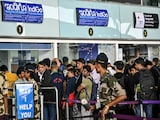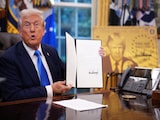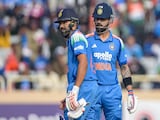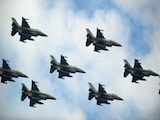India, following a deadly terror attack in Pahalgam that killed 26 civilians, is engaging non-permanent UNSC members. Pakistan is also a member of the influential UN body for the 2025-26 period.
In the wake of a deadly terror attack in Jammu and Kashmir's Pahalgam that claimed 26 civilian lives, India has reached out to its counterparts from eight non-permanent member nations of the United Nations Security Council (UNSC) as part of its diplomatic offensive. In telephonic conversations with Danish counterpart Lars Lokke Rasmussen on Wednesday, Foreign Minister S Jaishankar is understood to have conveyed to him India's resolve to bring the perpetrators of the April 22 attack to justice.
On Tuesday, External Affairs Minister S Jaishankar spoke to the Foreign Ministers of Algeria, Greece, Guyana, Panama, Sierra Leone, Slovenia and Somalia - all nations currently serving as non-permanent members of the UNSC for a two-year term. Follow Pahalgam Terror Attack Live Updates Here.
Mr Jaishankar's phone conversations with foreign ministers of the non-permanent member nations of the UNSC assume significance as Pakistan is also a member of the influential UN body for the 2025-26 period. Citing "cross-border linkages" to the horrific attack, India has promised severe punishment to those involved in the strike.
India has blamed Pakistan for the attack after The Resistance Front (TRF), a proxy of Pakistan-based terror group Lashkar-e-Taiba (LeT) claimed responsibility for it. Pakistan, meanwhile, denies responsibility and has called for a neutral probe.
Also Read: US Secretary Of State Marco Rubio Dials S Jaishankar, Pak PM. What He Said
Mr Jaishankar's phone calls with his counterparts from the non-permanent members of the UNSC come as India mulls options to respond to the terror attack. There is a possibility that the UNSC may again discuss the Pahalgam attack.
India's move came after New Delhi faced a tough battle in negotiating a statement at the UN Security Council. In its April 25 statement on the attack, the UN body condemned the terror attack in the "strongest terms" and reaffirmed that terrorism in all its forms and manifestations constitutes one of the "most serious" threats to international peace and security.
Also Read: ISI Chief Mohammad Asim Malik's New Role Amid India-Pakistan Tensions
However, the statement was seen as "inadequate" as Pakistan's efforts were evident in its attempts to adjust the phrasing of the UNSC statement. There were indications that the statement resulted from intense negotiations from Pakistan's side to modify the wording.
The non-permanent members are elected by the UN General Assembly for two-year terms, and their membership rotates.
The external affairs minister also received a call from UN Secretary General Antonio Guterres and conveyed to him, India's resolve to bring the "perpetrators, planners and backers" of this attack to justice.
Also Read: Pakistan Violates Ceasefire Along LoC For 7th Consecutive Night
"Appreciate his unequivocal condemnation of the terrorist attack in Pahalgam. Agreed on the importance of accountability," Jaishankar said in a social media post after the conversation with Guterres.
"India is resolved that the perpetrators, planners and backers of this attack are brought to justice," he said.
India's Diplomatic Offensive Against Pakistan
In the last few days, India reached out to various world capitals apprising the nations about the "cross-border" links to the terror attack.
Several world leaders, including US President Donald Trump, French President Emmanuel Macron, Israeli Prime Minister Benjamin Netanyahu, Egyptian President Abdel Fattah El-Sisi, Jordan's King Abdullah II and Italian Prime Minister Giorgia Meloni, also dialled Prime Minister Narendra Modi to condemn the attack.
Also Read: India Closes Airspace For All Pak Flights Days After Kashmir Terror Attack
Japanese Prime Minister Shigeru Ishiba, UAE President Mohamed Bin Zayed Al Nahyan, Iranian President Masoud Pezeshkian, Sri Lankan President Anura Kumara Dissanayake, Dutch Prime Minister Dick Schoof, US Vice President J D Vance, Australian Prime Minister Anthony Albanese and Nepal Prime Minister KP Sharma Oli also spoke to Modi.
On Sunday, PM Modi said the "perpetrators and conspirators" of the Pahalgam attack will be "served with the harshest response".
He asserted on Tuesday that the armed forces have "complete operational freedom" to decide on the mode, targets and timing of India's response to the Pahalgam attack. PM Modi also affirmed that it is the national resolve to deal a crushing blow to terrorism, government sources said.















